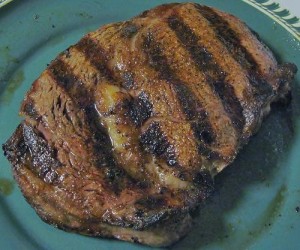Ron Rosedale, there are about a thousand ways that a person can look at health research and a thousand details to check. It’s so confusing. To understand how we work and how our metabolism works, what if we start by figuring out what questions to ask?
RON ROSEDALE: – Sorting through confusion—that’s really the way to go. Number one is to ask the right questions. If you don’t ask the right questions, you’re never going to get a useful answer. That’s why, for instance, in my blog on the “safe starch” debate, I posed four questions that really to me summarize what the debate is about, and then I answered them. People often ask the wrong questions, and so they keep getting answers that create a wild goose chase, or bad information. Getting the questions right – that’s a major key.
When it comes to questions, and what “kind of animal” are we, I’m thinking about the recent debates about metabolism. One question that few people ask is, “What’s the point of seeking a high metabolism? Instead, most people simply assume that a higher metabolism is a better one. For instance, in discussions of the recent Harvard study regarding the merits of high carb/low fat, versus other ways to eat, many experts and reporters focused on how many calories the test subjects burned. As background, in the Harvard Study, people ate one of three ways. Two were higher in carbs. The third was high in protein and fat and lower in carbs.
ALL the people were fed a deficit of calories that meant they lost weight, and then they were returned to a weight-stable level of calories, but rotated throughout the three different kinds of diets, keeping the calories the same on each diet. The researchers measured plenty – inflammatory markers, hormone signaling, and so on. What many researchers and reporters focused on is that people eating a lower-carbohydrate diet tended to burn more calories than people whose diets included more carbs. I’ll say that again: On the low-carb diet, the test subjects burned more calories a day than people burned on other kinds of diets. That caught people’s attention. Many praised that finding, saying a high metabolism is a good thing, because then, someone can eat more without gaining weight. Does that make sense? Is asking whether someone’s metabolism is higher, with the assumption that higher is a good thing, well, is that the right question?
RON ROSEDALE
No, not at all. We shouldn’t be asking the question, “How do I get a higher metabolism?” We should be asking the question, “How do I improve the quality of my metabolism?” Which is a very different story. Anybody can have a higher metabolism. You can do it, for instance, with recreational drugs and diet pills, many of which have been taken off the market,. These for the most part, will actually increase the rate of aging and its symptoms, as will many other ways to “raise” metabolism just for the sake of raising it such as the many “thermogenic aids” in “health food” stores. If you simply seek to increase metabolism, you’re just going to increase the rate of whatever kind metabolism you’ve got going, good or bad. So if you’ve got a less than optimal metabolism, and you just increase the rate of it, you’re just going to increase the damage that it’s doing. That’s what you see in many, many people. And that’s a major problem.
A related problem is a misunderstanding about how the thyroid, and diet, interact with metabolism. One of the major issues that one sees in the so-called safe starch debate, is that the advocates of eating more starches often warn that when you don’t eat carbs, you end up with a lower amount of the thyroid hormone, T3, in the blood, and this is a warning sign of hypothyroidism–meaning too little thyroid function. And that’s just such a wrong way of looking at it. Certainly when you eat a very low-carbohydrate, high-fat diet, the amount of T3 in your blood goes down—but in most cases, even though T3 goes down, your TSH – thyroid stimulating hormone – does not go up. TSH is a kind of thermostatic regulator. When the body actually needs more thyroid hormone, TSH generally rises, and pushes the thyroid to make more T3. When the body is getting enough thyroid, TSH generally stays low. So if your thyroid hormone levels go down while your TSH also stays in the low to normal ranges, it’s probably not because your thyroid is sick, any more than your pancreas is sick when your insulin level goes down on a very low-carbohydrate diet, and your blood sugars stay low as well. When insulin levels go down and blood sugar becomes more normal as well, it’s a clue that your cells are finally becoming less insulin resistant and are getting sensitive to a healthy, low level signal of insulin. In a similar way, a low TSH, coupled with a lower T3 level, is indicative, not of a sick thyroid, but more of proper signaling. You might say it indicates that your cellular resistance to the signals of thyroid is letting up. Your cells are getting more sensitive to thyroid signals, and your T3 level is going down precisely because cells can finally hear the signal properly. So a lower thyroid level, with low- to normal TSH, can indicate that your metabolism is now functioning at a higher-quality level. In other words, you’re getting more bang for each energy buck.
More bang for the buck is also happening, for instance, in calorie-restricted animals who live longer than animals fed a regular amount of calories. In calorie-restricted animals, researchers generally see a lower free T3. They also see lower T3 in centenarians, people who live past 100. When you see a lower free T3, it’s really indicative of kind of a longevity phenotype. It’s indicative of what you might even call, non-hibernating hibernation. And one clue that this lower T3 is healthy is that people who have it generally report that they function better. If it happens to you, on a low-carb diet that you’ve become adapted to over time, you’re not weak. You generally have more energy.
Having your T3 level go lower, in a healthy way, is like being able to turn down the idle of a car when it’s tuned properly, so that at rest it doesn’t have to waste as much energy. In an efficiently running car, the resting “metabolism” of the car is lower. And if you want to get power from that car, if you want to accelerate, that’s better too. When a car is well tuned, it allows for a lower idle speed, and it will actually accelerate faster, and the engine itself certainly will have a much longer lifespan. It’s functioning better.
Well, I suppose that metabolism can go TOO low. For instance, if we wanted our cars to have as low a metabolism as possible, we should keep them in the garage all the time and never drive them.
RON ROSEDALE
That’s true. Certainly one would have to then get into the depths of a discussion on what is life, and is the car really being a car if it’s really not doing anything? Is it being any more than a rock? It’s not functioning at all. That gets into more of a philosophical argument, and actually a scientific argument, but that’s probably a story for another day.
That’s a story for another day, but this issue regarding, how do we tell if our metabolism is at the right “idle speed”, it isn’t a question that most people ask. And it’s a concept that’s often missing in debates among experts about what kind of diet is the healthiest. For instance, in the Harvard study, their “low-carb/high fat diet” was actually a rather high protein diet. For years, high-protein advocates said that eating a high level of protein is wonderful, because when you eat a lot of protein, it burns with more heat, and since it burns with more heat, you can eat more of it and not gain as much weight. Does that make sense to you?
RON ROSEDALE
It makes sense, but again, it’s the wrong question. Improving health is not whether we gain or lose weight, it’s the kind of weight, number one. For instance, I don’t think anybody really wants to lose just any kind of weight. They don’t want to lose their muscle or their brain or their bones. They want extraneous adipose belly fat to be lost, typically. And if you’re seeking health, it’s not a matter of whether heat is produced, but really where that heat is going. If your body makes extra heat, you want to get rid of heat, number one. You have to get rid of it quickly. Inside the body, excess heat destroys. How about a fever?
A normal body temperature is less damaging for the body than the higher temperature of a fever. However, our body can handle a fever better than many invading organisms do, because a multicellular creature, such as a human, has more ways to protect against excess heat such as having heat shock proteins than, for instance, a virus does. Furthermore, the temporary higher temperature increases the activity of our immune system, and helps a body produce white blood cells faster. For all these reasons, occasionally, the body will produce a fever in order to kill an invader. If the fever goes too high, it kills too much of us as well. But if it stays at a level the body can handle, it kills off the invader faster. So short-term bursts of high fever, for our bodies, can be a valuable tool. But bodies don’t maintain a fever as a regular thing. Heat is a double-edged sword. It’s part and parcel of any type of energy exchange, and in some cases, we can use heat as a weapon for our body defense, but certainly excess heat destroys. That’s because our bodies, including each and every cell, need to work in a healthy, coordinated way. In contrast, heat is totally random, nonsensical motion that promotes incoordination.
Now, if heat-generation such as a fever, is only good for a short-term battle, it surprises me that some very well-respected scientists will say that it’s good news that eating protein causes thermogenesis, meaning it increases heat. The most common reason that many health experts praise thermogenesis is that, they say it means you can eat more food without gaining weight. Those same experts tend to say that the plague of modern society is that people get too fat when they eat as much as they want and so, the question to answer is, “How can people continue to eat as much as they want, and still keep their weight down?” And for them, the answer is, “Eat foods that take more energy to metabolize, because they make heat in the body and then the body supposedly stores less of the fuel as energy–that is, as fat.” Do you think it’s time for people to stop saying that this approach is healthy?
RON ROSEDALE
Yeah, it is.
So, whether it’s a car or a person, simply “fueling up” on something to increase the heat isn’t improving metabolic quality.
RON ROSEDALE
It isn’t a good thing. Producing excess heat can contribute to a whole lot of damage.
On the other hand, is it always bad to produce extra heat? As an example, an athlete who’s exercising is making heat. Is that okay?
RON ROSEDALE
That’s part of their training, to adapt to getting rid of heat fast. In other words, as they adapt to training, they will sweat more than they did when they began training. They’ll have better circulation to get rid of heat. It’s certainly part of the training, part of what will adapt them to being a better athlete, adapting to excreting heat.
And that’s true with ourselves as well, you think?
RON ROSEDALE
That’s true.
Now, some studies indicate that when people exercise more, their resting metabolism actually goes down. So they’re sort of like that car you described, which can idle at a lower speed, but performs faster and better when it’s time to put the pedal to the metal. That is, when they exercise, they produce more heat than someone who’s not exercising as hard. But when they’re resting, they have a lower metabolism. But is an athlete’s way of generating heat a reason to say that producing heat by eating more protein –ie– eating a more thermogenic diet — is that a good thing?
RON ROSEDALE
No, not at all. Again, it’s not—I think what you’re referring to then is the rate of metabolism. When a person switches to a low-carb diet, their metabolism overall isn’t necessarily increasing. The rate of metabolism might increase somewhat if they feel more energetic and start exercising more, and resting on the sofa less. And they might lose weight not because they’re burning more calories but instead because their hormones are signaling correctly and they’re less hungry. In other words, what’s happening on a very low-carbohydrate diet is, they’re improving the quality of their metabolism such that they’re able to burn fat properly and more importantly, ultimately enable better leptin and insulin signaling that will more appropriately apportion which fuel to burn when, in other words, when to burn fat and when not to. Most people are not able to burn fat — certainly not as readily as they need to or would want to. And the reason for that is because of inappropriate—or inaccurate, really—leptin signaling and even insulin signaling, more widely known as leptin and insulin resistance.
If somebody switches to eating fewer carbohydrates and they feel wiped out, do you wonder whether that person has adapted to fat-burning yet?
RON ROSEDALE
That’s correct. They’re not. For most of the people, and I’ve questioned a number, including many who attended the August, Ancestral Health Symposium at Harvard, most people who mention that they felt poorly when they went on a very low-carbohydrate diet, when you question them in detail, you find they were eating way too much protein–two, three, four times as much protein as I normally recommend. People have within themselves such a fear that fat is a bad thing to eat, unconsciously they avoid it, and the only thing you can eat if you’ve eliminated most carbs and you don’t eat fat, is protein. So when people go on a very low-carbohydrate diet, unless they consciously think about it all the time, they go high-protein, which can make them miserable.
So when people report feeling poorly when they go on a very low-carbohydrate diet—and by the way, most people don’t feel poorly, and many feel much more energetic. But among those who report they feel bad, it’s usually either that they haven’t given the switch to low carb, high fat eating a long enough time to get through the physiological adaptation this switch requires, or, they never get through that adaptation because they’re eating too much protein, or too much carbohydrate. Excess of either of these will prevent you from actually getting through that adaptation. For instance, they lower their carbohydrate some but not enough to really start burning fat. It only takes 100 grams of carbohydrate a day to prevent a person from properly going into ketosis, and therefore supplying the necessary “ketone” fuel for many different body functions that can’t simply burn fatty acids, such as the brain. Or, they eat so much protein, the excess protein raises insulin and also leads the excess protein to be burned or transformed by the body into sugar, and all that keeps them out of ketosis as well. And if you’re not generating ketones because you’re eating too many carbohydrates, or you’re eating too much protein, then certainly initially you’re going to have a difficult time and you’re not going to feel well.
And I wonder whether some people, for instance, Type 1 diabetics who give themselves shots of insulin and also shots of sugar to balance out the insulin, I wonder if the shots and the sugar mean that they never get to the point where their bodies are resilient about adapting to just burning fat.
RON ROSEDALE
I totally agree. What you really have to do is, you have to maintain low-sugar in your blood long enough to kind of turn down the glucostat. It’s like a thermostat, only with sugar, with glucose, so that the glucose goes down because you don’t need it so much. You’re training your body so that it’s just keeping a minimal amount of sugar available, and the ability to produce sugar if needed, for anaerobic emergencies, such as running from a tiger. But you’re not keeping excess sugar stores at the ready, because you have to burn sugar all the time because you’re unable to burn fat. Unfortunately, the vast majority of people on earth have trouble burning fat, meaning that they have too much sugar in their diets and in their blood, so they crave sugar all the time because they’re unable to properly burn fat, and I think it really is the base cause of the mass amounts of chronic diseases and premature aging that people are experiencing. These chronic diseases, such as diabetes and heart attacks, wouldn’t be happening if people would eat foods that are very low-sugar-forming carbohydrates, and if they would eat appropriate protein, but not high protein, and then fill in the appetite gaps by eating fat when necessary.
In addition to asking what foods improve hormone signaling, you’re also asking another question. You’re asking “What foods generate the most metabolic heat, simply to digest them, and what foods generate the least amount of heat? The answer to that question gives you a good strong predictor of what is going to lead to the least wear and tear on the body.
RON ROSEDALE
It is as simple as that. I don’t know if you read my last blog post on safe starches, where I posed four questions about “safe starches” and then answered them. Afterwards, some people posting comments about my blog brought forth the correct biochemistry, which is that you get many more ATP molecules from an equivalent gram amount of fat compared to glucose or protein. This supported my simple premise that fat is by far the most preferable fuel to burn. Fat producing the least heat and the most usable energy is taken right out of biochemistry textbooks.
Well, even if burning fat is so “useful”, is it healthy for everything? Could you feed fat to a hummingbird?
RON ROSEDALE
I think you probably could, actually, and perhaps it would live longer. I wouldn’t say it would live necessarily better–for it might have to give up the life of flitting from one flower to another–and eating fat wouldn’t necessarily be ideal to perpetuate a hummingbird genome – for if you could adapt a hummingbird to live off of fat, and you kept it near a great fat source, that individual hummingbird might live longer. But if all wild hummingbirds required fat, they would probably starve to death for lack of available food. They probably wouldn’t have babies. So Nature has adapted hummingbirds to be sugar eaters. And that’s the “nature” of Nature. Nature is not concerning itself totally with longevity. It doesn’t care. It’s concerned about the longevity of the genome, not about the temporary caretakers of that genome, the soma, that is, the cells that keep our body going — in contrast to the cells that are designed to make new babies. Nature’s only concern with our soma, our body, is to keep it going long enough for us to get to the next generation going and help it stand on its own two feet.
What’s natural, I think, is not necessarily what’s healthiest for one particular hummingbird, or person — after all, most people would consider health as meaning that you, as an individual, lead a long, healthy—including post-reproductive-life health—life. Nature, I don’t think, ever really cares much about post-reproductive health and longevity, other than as it pertains to parenting and perhaps grand parenting so that the baby can grow old enough to essentially fend for itself. If you ask the question, “How does longer life of the parents affect survival of the next generation?” then you can answer some puzzles. For instance, why do humans live much longer than chimpanzees?
We take longer to grow up?
RON ROSEDALE
That’s right. Human babies are helpless when they’re born, and it takes a long time for them to have a reasonable chance of survival. Longer than it takes for a chimpanzee baby. So Nature has endowed human parents and even grandparents with a long enough lifespan to enable to children to grow old enough to take care of themselves. That’s probably why humans live longer than chimpanzees. But even among humans, there’s a time when the advantages of living longer don’t clearly add benefit to the lives of our offspring. So I think that we have to get away from constantly thinking that what’s natural is what’s best for individual health. So, just looking at the the idea of what’s natural. Just do what’s natural. Eat what’s natural. There’s a big argument about what “natural” actually is. And simply asking the question, “What has been mankind’s ‘natural’ way to eat?” is not the same as asking, “How can I eat to maintain my health and life as long as possible?” But that question of individual longevity is a question we can strive to answer. We can work to use the best science that tells you how nature allowed a human, or perhaps any life, to live a long and healthy lifespan, especially during the time period before reproduction begins, when the needs are highest to preserve vitality. As we find out more about what those secrets are to living a healthy life before the time comes to produce offspring, then we can apply those secrets to both the reproductive and the post-reproductive years. You can apply them at any time of life. For instance, what we’re seeing is that nature has endowed virtually all animal life with a means of outliving a famine so that it could then reproduce at a future, more opportune time. As part of this, all life maintains chemical sensors, hormonal pathways that tell the genes and the genome, and every cell, what the nutrient availability is. And when a body senses food is low, it up-regulates instructions to virtually every cell, making maintenance and repair of that cell a greater priority. It increases each cell’s DNA repair and intracellular antioxidant systems and heat shock proteins and what’s called autophagy, which kind of cleans up the garbage inside the cell faster and better.
One can take what you just said about gearing up to survive a famine to assume that humans are doomed to have to eat and eat and eat because we’re programmed to deal with famines. Is that what you’re saying?
RON ROSEDALE
Not really. In fact, eating low-carb/high fat tends to keep appetite very low. When it comes to health, and longevity, and maintaining an ideal body weight, the major secret to this way of eating, is that the “famine signal” that leads to hunger and all the rest is extremely ancient. It must have arisen shortly after life began itself, even with single-cell organisms in the ocean, which means it occurred before there was oxygen in the atmosphere. And life was flourishing for millions, even billions of years, before there was enough oxygen in the atmosphere that “life” was allowed to even use fat as fuel. You have to have oxygen to be able to burn fat. You don’t need oxygen to burn glucose. And therefore these famine signals are dependent on two major nutrients, glucose and protein, certain amino acids, but not fat. And that’s a real key. In other words, if you keep your glucose intake low, such that insulin signaling and leptin signaling stay down, and yes, by the way — the secretion of leptin is largely dependent on how much glucose a person ate. Leptin signaling is influenced by sugar more than fat, even, and that’s something that everybody just argues about, but it’s very, very clear in the literature. But in any event, if you keep your sugar levels low, and also if you don’t eat excess protein, such that you don’t raise a pathway known as MTOR, which senses amino acid and protein availability, you keep those low, it then mimics calorie restriction. Caloric restriction increases longevity in all kinds of animals. But you don’t have to be calorie restricted to gain those benefits, because you can eat fat. It’s kind of a free ride. It doesn’t get the body into believing that you’ve got nutrient excess that needs to be stored away in order to survive a famine, or used to produce a new generation of cells or offspring. It allows the body to stay in the mode of maintenance and repair.
You’re talking about the evolution of our signaling pathways, and how fat helps them stay settled down and promotes more health in us. But could it also be that eating and storing fat is also doing something even more basic? Could it be causing less heat damage in terms of how it’s stored and how it’s metabolized?
RON ROSEDALE
That’s exactly true. So one can look at fat as being a much cleaner-burning fuel than sugar, which it is. It does cause less damage than if you were to burn sugar as your everyday fuel. But people around the world are being forced to burn sugar all the time because they can’t burn fat properly, and the reason for that is because the signals that tell you whether to burn fat or glucose, namely leptin and insulin, have been so corrupted over time because of our modern, high-carb diets, in particular, that their bodies can’t properly so-call “fuel partition.” They can’t switch over between fat and sugar properly.
Many animals DO have the ability to switch between fat and sugar fuels very quickly. For instance, a hummingbird drinks basically soda water, and during the day, its blood sugars are sky-high. Over 600-a blood sugar that could kill a human. But a hummingbird burns the sugar fast, and any excess goes into its liver. The liver gets incredibly fatty, but then at night, the hummingbird burns most of that fat away. So it’s got an incredibly balanced system for switching from sugar burning to fat burning.
RON ROSEDALE
So when you look at a lot of the animal examples, number one, the key is that nature isn’t really caring if they live a long life. Nature is just trying to get them to live long enough to be able to reproduce. But two, they continue to have proper fuel partitioning, like you mentioned. They can burn fat where and when appropriate. So even though they might store fat in their livers, they can then get it out of their livers very easily and readily. In modern people, the problem with leptin resistance,, is that they can’t easily switch from burning sugar to burning fat. And then they store a lot of abdominal fat that they’re not able to access properly. So it continues to build and then infringe on the vital organ system, such as liver function and heart function, etc. So that is the main problem, and that might take a long time to develop, but once it’s there, it’s a problem. And humans face another challenge that many animals don’t, simply because most animals don’t live long enough to get stuck with this long-term problem. For instance, in humans and in hummingbirds, certain molecular processes, like, advanced glycated end products, take a while to accumulate, and it could be that some of these animals that survive on high-carb fuels just don’t live long enough to be able to accumulate glycation to any great degree that would impair their insulin and leptin signaling.
We know, for instance, that humans live a fairly healthy life through childhood, although now we’re starting to get even so-called adult-onset diabetes in the young. But for the most part, children are much healthier than adults. They can eat, and they do eat lots of junk food, but they don’t suffer from diabetes and obesity and heart disease generally until later in life. And the reason for that is because a young body can make proper compensations for eating poorly. It can burn the excess off faster. Their bodies can increase thermogenesis, so to speak. That extra burning off of energy is not necessarily healthy, but the kids don’t notice it at the moment. But what it does is, it starts the leptin and insulin signaling going wrong at an early stage, which increases the chance that later in life, their bodies can no longer make the appropriate compensations for eating poorly. And then they get problems that we currently call diseases. Their blood sugars go up, and we call it diabetes. They become obese. If we started measuring insulin and leptin resistance or sensitivity early in life, you’d find that there was a progression almost from a moment they were born, in fact even before they were born, depending on what their mothers ate. If a mom is eating a high carb diet, her child can be born already insulin and leptin resistant.
Are some people more fortunate, and their bodies are more resilient at dealing with the hit of transitioning back and forth between fat burning and sugar burning? After all, some athletes say that all their exercise keeps their bodies strong and more resilient at dealing with different foods and also dealing with the generation of heat.
RON ROSEDALE
That’s exactly true. The statement that I made decades ago now I think still holds true. The more fat you burn, the healthier you’ll be, and the more sugar you burn, the less healthy you’ll be. Provided you don’t get hit by a Mack truck.













7 comments for “Thermogenesis – Not So Good For Health – Ron Rosedale”